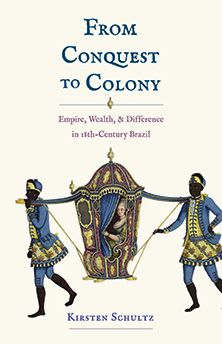Kirsten Schultz, Ph.D., Crafts a New History of Brazil: On Writing From Conquest to Colony (Yale University Press, 2023)
Monday, October 16, 2023

Kirsten Schultz, Ph.D.
Kirsten Schultz, Ph.D., has been thinking about history and its political implications for a long time. Specifically, the history of the Lusophone world. While an undergraduate student exploring Madrid, Spain, she began to ponder Brazil and Portugal’s relationship to wealth and their related imperial networks. But, Schultz, who teaches a broad range of courses on Latin America’s history at Seton Hall, and is the author of two books on historical conflicts in Portugal and Brazil, reported that her love of history started even earlier. “I was fortunate to have great history teachers in middle school and high school,” she remembered. "I had access to museums and public libraries. I read a lot. In middle school I liked historical fiction and biographies. But it was my first undergraduate history courses that persuaded me that I wanted to be a historian."
With a B.A. in history and political science from the University of California, Berkeley, a Master’s in history and a Ph.D. from New York University, Schultz has long been a historian of Latin America and the Iberian Atlantic. Her research focuses on Brazil and the Portuguese empire from 1500 to the 1820s. From speaking with her and a cursory read of press materials, it’s clear that her interest lies in looking at how people understood and agreed with - or contested - political authority in colonized places, at specific times. At the time of this writing, the author and Seton Hall professor messaged from Madrid’s richly textured urban landscape - there again for a quick recreational trip - that her collegiate seminal visit was impactful. It later compelled her to write books like her newest, From Conquest to Colony (New Haven: Yale University Press, 2023), which begins where her earlier work, Tropical Versailles (2001), ended - and left her with a central question. "Tropical Versailles looked at how, among other things, people living in Rio and people who remained behind in Portugal grappled with what it meant for a sovereign to live in a territory that had been at that point described as a colony - but it was now the center of the Empire," she recently told Zet Forward, the University Libraries podcast series.
 "From Conquest to Colony examines debates about wealth, difference, and governance and how they informed understandings
of Brazil’s status within the eighteenth-century Portuguese empire," she explains.
The book explores how Brazil’s status as a colony forced the conflict in different,
coexisting societies of Africans, Europeans, and Indigenous peoples, whether they
were rich, poor, enslaved or free; all experienced issues related to their own ancestry,
legal status, and socioeconomic standing in Schultz’s research time period.
"From Conquest to Colony examines debates about wealth, difference, and governance and how they informed understandings
of Brazil’s status within the eighteenth-century Portuguese empire," she explains.
The book explores how Brazil’s status as a colony forced the conflict in different,
coexisting societies of Africans, Europeans, and Indigenous peoples, whether they
were rich, poor, enslaved or free; all experienced issues related to their own ancestry,
legal status, and socioeconomic standing in Schultz’s research time period.
"After I finished Tropical Versailles I kept coming back to a few questions I had thought of as I was wrapping up the project, one of which was about when the Portuguese began to call Brazil a colony.” From Conquest to Colony, Schultz continued, “grapples with the connections that surface in the answers to those questions." Schultz reports that she’s been interested in political history and the "question of what makes people see the exercise of authority as legitimate" since she studied history and political science as an undergraduate. "From Conquest to Colony looks at these questions in the context of eighteenth-century Brazil, and how social order and expressions of authority were shaped by wealth and inequality."
From Conquest to Colony took 15 years to research and write, she notes, requiring multiple trips to libraries and little known archives in Portugal. "It took me a long time to write this book!" she says. "I started around 2009, and I had to use several different archives and rare book collections. I worked with a wide variety of sources, from official records to pamphlets." She had to consult some collections in person, and explored several large, digitized collections. "The research process can take time as well, because it requires taking stock of the sources and evidence that you’ve already read and then revising the next phase of research and writing accordingly. It requires reading about other historians’ research, in my case in both Portuguese and English." She remarks it’s worth noting that these efforts must happen while authors who are professors are teaching and living their lives, too.
Asked who the intended audience for From Conquest to Colony is, Schultz paused. "The book’s intended audience is primarily historians and other scholars interested in Brazil, the early modern world, in histories of colonialism and empire." But, she says, "After a scholarly book is published, there are also opportunities to write about the research material for a broader audience. For example, Yale University Press asked me to write a short piece related to the research for the press blog. I wrote about a very interesting source that I found in Oliveira Lima Library at Catholic University in Washington D.C.", she explained.
It’s also important to understand that though From Conquest to Colony’s research focuses on events of 18th century Brazil, the material has relevance to political systems in American history. "My research addresses many questions central to societies and economies that depended on the labor of enslaved Africans. It shows how central slavery was to political and economic thought."
So might From Conquest to Colony appeal to a “broader audience”, which one might consider the general public? "The question of the “general public" is interesting and contingent on which general public we’re talking about,” Schultz considers. "My first book, on early 19th-century Rio de Janeiro, was also written primarily for a scholarly English-reading audience, but it was translated into Portuguese and was read more widely in Brazil. I’ve [also] been interviewed by Brazilian newspapers about the subject of the book." However the book finds its readers, fellow history scholars agree that Schultz has done a masterful job with the material. "Kirsten Schultz’s magnificent study of the Portuguese-Brazilian empire’s golden age…is impressive, and the writing gilded. It must be read by all historians of the Atlantic world," praises Princeton University’s Jeremy Adelman. Gabriel Paquette of the University of Maine agrees: "In this stunningly original book, Kirsten Schultz skillfully weaves disparate historiographical threads as well as her own analysis of little-known sources to present a new, compelling interpretation of the Luso-Brazilian world in the eighteenth century."
Considering that this article may be read by Seton Hall professors, scholars and students alike, Schultz shares her thoughts on the connection between teaching and research. "A big part of teaching about the past is teaching students to read critically primary sources as evidence," she says. "This requires paying close attention to the type of source, learning about the author(s), why they wrote the source, and what they aimed to achieve. Historians like to think about context but also about how people intervened in and tried to change their circumstances."
Categories: Arts and Culture


